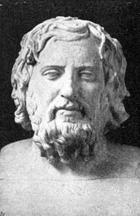
Jenofonte (in Greek ξενοφῶν xenofṓn, ca. 431 BC.-354 BC) was a historian, military and philosopher of ancient Greece. As a historian, Jenofonte was a chronicler of his time, the end of the 5th century and the beginning of the IV a. C., in works such as Hellenics, on recent years and the consequences of the Peloponnese War (431-404 BC) and the thematic continuation of the History of the Peloponnese War of Thucydides. As a member of the ten thousand expedition, he participated crucially in the failed Military Campaign of Ciro the Young From him, anabasis. Like Plato, Jenofonte is an authority in his teacher's teacher, about which he wrote several books of his dialogues in memories of Socrates and the apology of Socrates, which tries to clarify his judgment in 399 a. C.
Despite born in Athens, Jenofonte had close ties with Sparta, the traditional enemy of the Athenians. Its policies in favor of the oligarchy, its military services under the command of Spartan generals in campaigns such as Persian and their friendship with King Agesilao II made them attracted to the Spartans, as evidenced by the Protanous tone of his works such as biography Real Agesilao and the constitution of lacedemonios.
Jenophon's works cover several genres and are written in the simple attic dialect of the ancient Greek language, which is why it is very translated by the current students of that language. In the biographical work lives, opinions and sentences of the most illustrious philosophers, the historian Diogenes Laercio observed that, as a writer, Jenophon of Athens was known as the "attic muse" for the sweetness of his diction.





